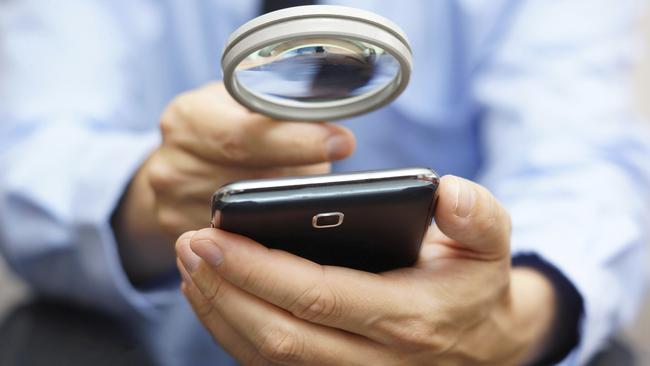How to protect your mobile phone and tablet from scammers
FRAUDSTERS are targeting your smartphones and tablets so take some time to keep their hands off your money and your data.

MOBILE technology such as smartphones and tablets are giving scammers fresh ways to steal your money.
As the number of mobile devices used by Australians continues to surge, freshly boosted by last week’s launch of Apple’s new iPhone, consumers are being warned to be more vigilant than ever.
Researchers say there are 25 million mobile services in Australia, more than one per person, with smartphones owned by 90 per cent of households and tablets owned by 60 per cent. It’s rich pickings for fraudsters who are mainly based overseas.
“Scammers are getting better at what they do,” says Australian Competition and Consumer Commission deputy chair Delia Rickard.
“We have had more calls already this year about scams than all of last year.”

The ACCC’s Targeting Scams report found that phone and text message scams remain the most common delivery method, although a large proportion is still through landline phone calls that typically target older, vulnerable consumers.
One-third of all victims have been targeted by scammers through social media sites.
“Scams delivered online, including email, internet and social networking platforms, account for $37.6 million or 44 per cent of losses for reports identifying the scammer contact method,” the report says.
Rickard says SMS scams typically ask you to respond to an offer and result in you being charged high call rates or subscriptions.
“Tablets and smartphones are not impervious to scams and malware,” she says.
Older Australians hit by investment scams
The most likely way to get your mobile device infected is to download apps from non-official channels, Rickard says. Consumers should stick to the official iTunes and Android app stores and always allow devices’ security updates.
“Be wary of free downloads such as music, free apps, games and downloads from adult sites, which often contain harmful software,” Rickard says.
Making tap-and-go credit card payments with smartphones opens another channel for scammers, so it’s important to keep your device protected by passwords and security updates to it being used as a free credit card.
People’s Choice Credit Union CEO Steve Laidlaw says people sometimes forget that they now carry supercomputers in their pockets.
“Just like any computer, mobile devices are at risk of attack by hackers,” he says.

“By installing security software, turning on the safety features of your device, activating login authentication on the device, SIM card and voicemail and by making sure Bluetooth is turned off when you’re not using it, you’ll help secure our personal information.”
Laidlaw says you should be careful when banking and shopping online, and never open attachments or links in emails or SMS messages from unknown and unexpected sources. Spelling and grammar mistakes can be a big giveaway in scam messages sent to you, he says.
“Avoid using free public Wi-Fi when sharing personal information online as these networks are not secure, and are easy for hackers to access.
“If you’re at the airport, in a cafe or on public transport, be aware of what’s on your screen and what is visible to others. Criminals can observe passwords and other private details from your screen without you knowing, so consider a privacy film for your device.”



